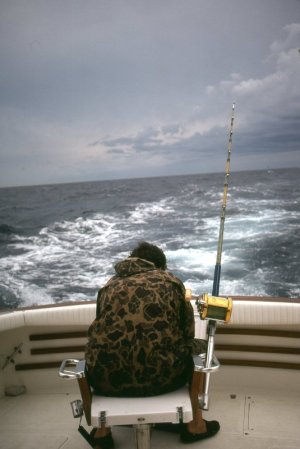I am currently going through physical therapy for a broken hip, and part of that is testing my balance. When I mentioned to my therapist that my balance has always been bad and that’s why I have never been seasick, he said he never heard that before. I explained to him that people with excellent balance tend to get seasick because as the boat moves, their inner ear keeps trying to correct their balance, making them dizzy and soon sick. For people like me with lousy balance, when the boat moves, the inner ear says let the big dummy fall. It is true that when I come home after a day at sea I am still moving with the boat, even after I go to bed.
The first person I saw get seasick was a girl on our Claymont High School band trip to New York City. Part of the trip was a Circle Line Cruise around Manhattan Island, and she got sick on the very calm Hudson River.
The next few folks I encountered who became seasick had good reason. I was still in high school, and Al Cartwright and I went mackerel fishing on the head boat out of what was then the Northside Marina. I believe it was the Triple Nickle – a very solid boat, but very slow. As we plodded our way toward B Buoy, the boat rolled in the cold, spring waves, and quite a few of our passengers became ill. Some recovered when the catching began, while others never wet a line.
The next time I went to sea, it was on the USS Saratoga. Now you might think no one could get seasick on an aircraft carrier, but you would be wrong.
We had ended our Med Cruise in 1962 and were headed to Mayport, Fla., across the North Atlantic when we hit a really nasty storm. The waves were so high that we had green water running down the flight deck.
The captain decided to test the crew in rough conditions and called general quarters. Several of us were in the ET Shack (electronics technicians shop) when a call came from SEC COM (secondary command) that they needed an ET up there. One of our youngest volunteered and off he went.
SEC COM was up on the bow under the flight deck. In order for the ship to take green water down the flight deck, the bow had to be underwater. That means the bow was pointing to the sky one minute and then it would drop down and go underwater the next. After a short time, two radiomen came bringing the ET volunteer back to the shop because he was sick as a dog.
Like I said, some folks get seasick because they have great balance, while others bring it on because of their bad habits.
A case in point was my wife’s cousin Dave. He wanted to go fishing with me and he was a great guy, so I was more than happy to take him out to B Buoy for some sea bass and flounder. Unfortunately, he did a little too much celebrating before the trip and was still a little drunk when we left the launch ramp at Northside Marina, the newer one.
He was fine on the run out, but once I cut the engine and we began to drift with the waves rocking the deep-vee hull on my 24-foot Albemarle, all that pizza and beer from the night before came roaring up. Then the dry heaves took over. You would have thought he was trying to call in the seals that hang out on the Outer Wall off Lewes. I gave him a bucket of water and a rag so he could clean up any vomit he got on my boat.
Meanwhile, my son Roger and I were catching sea bass and flounder at a reasonably steady pace.
Please don’t get me wrong. I have great sympathy for those who get seasick when they are sober, but drunks who come on board already dizzy have only themselves to blame.
There are exceptions. On another mackerel trip on a cold and windy March day, I was standing on the lee rail when a rather large gentleman came out the door, with a beer in his hand at 6 a.m., asked how long before we get to go fishing, took a bite from his plug of chewing tobacco and then went back in the cabin. I made sure I fished upwind from him all day.
The only sure cure for seasickness is scopolamine. You have to get a doctor’s prescription and place the patch behind your ear before you get on the boat. Once you get sick, the only cure is dry land.






















































